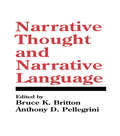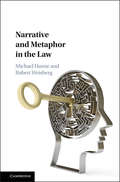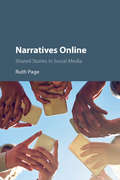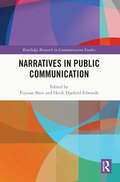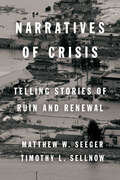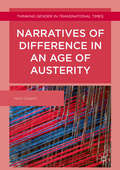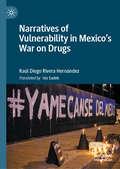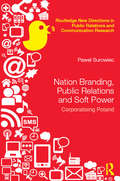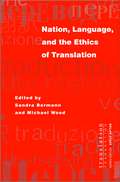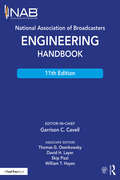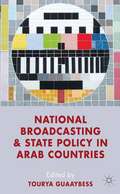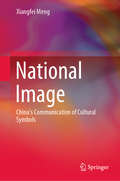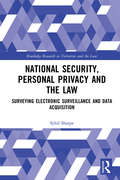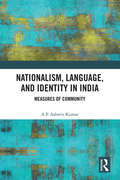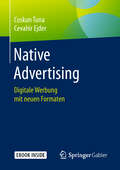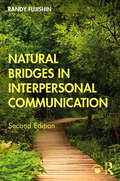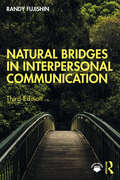- Table View
- List View
Narrative Responses to the Trauma of the French Revolution
by Katherine AstburyDuring the French Revolution, traditional literary forms such as the sentimental novel and the moral tale dominate literary production. At first glance, it might seem that these texts are unaffected by the upheavals in France; in fact they reveal not only a surprising engagement with politics but also an internalised emotional response to the turbulence of the period. In this innovative and wide-ranging study, Katherine Astbury uses trauma theory as a way of exploring the apparent contradiction between the proliferation of non-political literary texts and the events of the Revolution. Through the narratives of established bestselling literary figures of the Ancien Regime (primarily Marmontel, Madame de Genlis and Florian), and the early works of first generation Romantics Madame de Stael and Chateaubriand, she traces how the Revolution shapes their writing, providing an intriguing new angle on cultural production of the 1790s.Katherine Astbury is Senior Lecturer in French Studies at the University of Warwick.
Narrative Therapy in Practice: The Archaeology of Hope
by Gerald Monk Kathie Crocket David Epston John WinsladeHow to apply the definitive postmodern therapeutic technique in a variety of situations, including treating alcoholics, counseling students, treating male sexual abuse survivors, and more. Written with scholarship, energy, practicality, and awareness.
Narrative Thought and Narrative Language (Cog Studies Grp of the Inst for Behavioral Research at UGA)
by Bruce K. Britton A. D. PellegriniSince before the dawn of history, people have been telling stories to each other and to themselves. Thus stories are at the root of human experience. This volume describes empirical investigations by Jerome Bruner, Wallace Chafe, David Olson, and others on the relationship between stories and cognition. Using philosophical, linguistic, anthropological, and psychological perspectives on narrative, the contributors provide a definitive, highly diversified portrait of human cognition.
Narrative Traditions in International Politics: Representing Turkey (The Palgrave Macmillan Series in International Political Communication)
by Johanna VuorelmaThis book introduces the concept of narrative tradition to study representation in international politics. Focusing specifically on the case of Turkey, the book shows how narrative traditions are constructed, maintained, and passed on by a loose epistemic community that involves practitioners and experts including scholars, journalists, diplomats, and political representatives. Employing an interpretative approach, the book distinguishes between four narrative traditions in the study of Turkey: Turkey as a state that is (1) getting lost, (2) standing at a decisive crossroad, (3) led by strongmen, and (4) struggling with a creeping Islamisation.These narrative traditions carry enduring beliefs that not only describe, moralise, judge, and stigmatise Turkey, but also contribute to the idea of the West. The book focuses on knowledge that is produced from a Western perspective, showing that Turkey provides a channel through which the Western self can be debated, challenged, celebrated, and judged.
Narrative and Metaphor in the Law
by Robert Weisberg Michael HanneIt has long been recognized that court trials, both criminal and civil, in the common law system, operate around pairs of competing narratives told by opposing advocates. In recent years, however, it has increasingly been argued that narrative flows in many directions and through every form of legal theory and practice. Interest in the part played by metaphor in the law, including metaphors for the law, and for many standard concepts in legal practice, has also been strong, though research under the metaphor banner has been much more fragmentary. In this book, for the first time, a distinguished group of legal scholars, collaborating with specialists from cognitive theory, journalism, rhetoric, social psychology, criminology, and legal activism, explore how narrative and metaphor are both vital to the legal process. Together, they examine topics including concepts of law, legal persuasion, human rights law, gender in the law, innovations in legal thinking, legal activism, creative work around the law, and public debate around crime and punishment.
Narratives Online: Shared Stories in Social Media
by Ruth PageStories are shared by millions of people online every day. They post and re-post interactions as they re-tell and respond to large-scale mediated events. These stories are important as they can bring people together, or polarise them in opposing groups. Narratives Online explores this new genre - the shared story - and uses carefully chosen case-studies to illustrate the complex processes of sharing as they are shaped by four international social media contexts: Wikipedia, Facebook, Twitter and YouTube. Building on discourse analytic research, Ruth Page develops a new framework - 'Mediated Narrative Analysis' - to address the large scale, multimodal nature of online narratives, helping researchers interpret the micro- and macro-level politics that are played out in computer-mediated communication.
Narratives in Motion: Journalism and Modernist Events in 1920s Portugal (Remapping Cultural History #15)
by TrindadeInterwar Portugal was in many ways a microcosm of Europe's encounter with modernity: reshaped by industrialization, urban growth, and the antagonism between liberalism and authoritarianism, it also witnessed new forms of media and mass culture that transformed daily life. This fascinating study of newspapers in 1920s Portugal explores how the new "modernist reportage" embodied the spirit of the era while mediating some of its most spectacular episodes, from political upheavals to lurid crimes of passion. In the process, Luís Trindade illuminates the twofold nature of that journalism-both historical account and material object, it epitomized a distinctly modern entanglement of narrative and event.
Narratives in Public Communication (Routledge Research in Communication Studies)
by Fuyuan Shen Heidi Hatfield EdwardsThis volume explores the applications of narrative and storytelling in corporate, public health, and political communications, and its implications for those fields. Using diverse research methods including surveys, experiments, case studies, and content analyses, an international team of authors first explore conceptual and theoretical issues of narrative persuasion, then examine the impact and application of narratives in science communication, political advertising, corporate communication, and social movement before discussing the use of stories in community building, identity construction, and civic engagement. This timely volume will be of interest to academics, researchers, and graduate students who are interested in narratives and communications, within the areas of public relations, public communication, organizational communication, strategic communication, risk and crisis communication, and political communication.
Narratives of Crisis: Telling Stories of Ruin and Renewal
by Timothy Sellnow Matthew SeegerHow did you first hear about 9/11? What images come to mind when you think of Hurricane Katrina? How did your community react to the Sandy Hook Elementary School shooting? You likely have your own stories about these tragic events. Yet, as a society, we rarely stop to appreciate the narratives that follow a crisis and their tremendous impact. This book examines the fundamental role that narratives play in catastrophic events. A crisis creates a communication vacuum, which is then populated by the stories of those who were directly affected, as well as crisis managers, journalists, and onlookers. These stories become fundamental to how we understand a disaster, determine what should be done about it, and carry forward our lessons learned. Matthew W. Seeger and Timothy L. Sellnow outline a typology of crisis narratives: accounts of blame, stories of renewal, victim narratives, heroic tales, and memorials. Using cases to illustrate each type, they show how competing accounts battle for dominance in the public sphere, advancing specific organizational, social, and political changes. Narratives of Crisis improves our understanding of how consensus forms in the aftermath of a disaster, providing a new lens for comprehending events in our past and shaping what comes from those in our future.
Narratives of Difference in an Age of Austerity
by Irene GedalofThis book traces the narrative strategies framing austerity policies through an illuminating analysis of policy documents and political discourses, exposing the political consequences for women, racialized minorities and disabled people. While many have critiqued the ways in which austerity has captured the contemporary political narrative, this is the first book to systematically examine how these narratives work to shift the terms within which policy debates about inequality and difference play out. Gedalof's exceptional readings of these texts pay close attention to the formal qualities of these narratives: the chronologies they impose, their articulation of crisis and resolution, the points of view they construct and the affective registers they deploy. In this manner she argues persuasively that the differences of gender, race, ethnicity and disability have been stitched into the fabric of austerity as excesses that must be disavowed, as reproductive burdens that are too great for the austere state to bear. This innovative, intersectional analysis will appeal to students and scholars of social policy, gender studies, politics and public policy.
Narratives of Place, Belonging and Language: An Intercultural Perspective (Language and Globalization)
by Máiréad Nic CraithExamining identity in relation to globalization and migration, this book uses narratives and memoirs from contemporary authors who have lived 'in-between' two or more languages. It explores the human desire to find one's 'own place' in new cultural contexts, and looks at the role of language in shaping a sense of belonging in society.
Narratives of Vulnerability in Mexico's War on Drugs
by Raúl Diego Rivera HernándezThis book explores the current human rights crisis created by the War on Drugs in Mexico. It focuses on three vulnerable communities that have felt the impacts of this war firsthand: undocumented Central American migrants in transit to the United States, journalists who report on violence in highly dangerous regions, and the mourning relatives of victims of severe crimes, who take collective action by participating in human rights investigations and searching for their missing loved ones. Analyzing contemporary novels, journalistic chronicles, testimonial works, and documentaries, the book reveals the political potential of these communities’ vulnerability and victimization portrayed in these fictional and non-fictional representations. Violence against migrants, journalists, and activists reveals an array of human rights violations affecting the right to safe transit across borders, freedom of expression, the right to information, and the right to truth and justice.
Narratives, Health, and Healing: Communication Theory, Research, and Practice (Routledge Communication Series)
by Christina S. Beck Lynn M. Harter Phyllis M. JappThis distinctive collection explores the use of narratives in the social construction of wellness and illness. Narratives, Health, and Healing emphasizes what the process of narrating accomplishes--how it serves in the health communication process where people define themselves and present their social and relational identities. Organized into four parts, the chapters included here examine health narratives in interpersonal relationships, organizations, and public fora. The editors provide an extensive introduction to weave together the various threads in the volume, highlight the approach and contribution of each chapter, and bring to the forefront the increasingly important role of narrative in health communication.This volume offers important insights on the role of narrative in communicating about health, and it will be of great interest to scholars and graduate students in health communication, health psychology, and public health. It is also relevant to medical, nursing, and allied health readers.
Nation Branding, Public Relations and Soft Power: Corporatising Poland (Routledge New Directions in PR & Communication Research)
by Pawel SurowiecNation Branding, Public Relations and Soft Power: Corporatizing Poland provides an empirically grounded analysis of changes in the way in which various actors seek to manage Poland’s national image in world opinion. It explores how and why changes in political economy have shaped these actors and their use of soft power in a way that is influenced by public relations, corporate communication, and marketing practices. <P><P>By examining the discourse and practices of professional nation branders who have re-shaped the relationship between collective identities and national image management, it plots changes in the way in which Poland’s national image is communicated, and culturally reshaped, creating tensions between national identity and democracy. The book demonstrates that nation branding is a consequence of the corporatization of political governance, soft power and national identity, while revealing how the Poland "brand" is shaping public and foreign affairs. <P><P>Challenging and original, this book will be of interest to scholars in public relations, corporate communications, political marketing and international relations.
Nation, Language, and the Ethics of Translation (Translation/Transnation #10)
by Sandra Bermann and Michael WoodIn recent years, scholarship on translation has moved well beyond the technicalities of converting one language into another and beyond conventional translation theory. With new technologies blurring distinctions between "the original" and its reproductions, and with globalization redefining national and cultural boundaries, "translation" is now emerging as a reformulated subject of lively, interdisciplinary debate. Nation, Language, and the Ethics of Translation enters the heart of this debate. It covers an exceptional range of topics, from simultaneous translation to legal theory, from the language of exile to the language of new nations, from the press to the cinema; and cultures and languages from contemporary Bengal to ancient Japan, from translations of Homer to the work of Don DeLillo. All twenty-two essays, by leading voices including Gayatri Spivak and the late Edward Said, are provocative and persuasive. The book's four sections--"Translation as Medium and across Media," "The Ethics of Translation," "Translation and Difference," and "Beyond the Nation"--together provide a comprehensive view of current thinking on nationality and translation, one that will be widely consulted for years to come. The contributors are Jonathan E. Abel, Emily Apter, Sandra Bermann, Vilashini Cooppan, Stanley Corngold, David Damrosch, Robert Eaglestone, Stathis Gourgouris, Pierre Legrand, Jacques Lezra, Françoise Lionnet, Sylvia Molloy, Yopie Prins, Edward Said, Azade Seyhan, Gayatri Chakravorty Spivak, Henry Staten, Lawrence Venuti, Lynn Visson, Gauri Viswanathan, Samuel Weber, and Michael Wood.
National Association of Broadcasters Engineering Handbook
by Garrison C. CavellThe NAB Engineering Handbook is the definitive resource for broadcast engineers. It provides in-depth information about each aspect of the broadcast chain from audio and video contribution through an entire broadcast facility all the way to the antenna. New topics include Ultra High Definition Television, Internet Radio Interfacing and Streaming, ATSC 3.0, Digital Audio Compression Techniques, Digital Television Audio Loudness Management, and Video Format and Standards Conversion. Important updates have been made to incumbent topics such as AM, Shortwave, FM and Television Transmitting Systems, Studio Lighting, Cameras, and Principles of Acoustics. The big-picture, comprehensive nature of the NAB Engineering Handbook will appeal to all broadcast engineers—everyone from broadcast chief engineers, who need expanded knowledge of all the specialized areas they encounter in the field, to technologists in specialized fields like IT and RF who are interested in learning about unfamiliar topics. Chapters are written to be accessible and easy to understand by all levels of engineers and technicians. A wide range of related topics that engineers and technical managers need to understand are covered, including broadcast documentation, FCC practices, technical standards, security, safety, disaster planning, facility planning, project management, and engineering management.
National Broadcasting and State Policy in Arab Countries
by Tourya GuaaybessA state-of-the-art analysis of the situation of national television in Arab countries, addressing what Arab national broadcastings today say about public policy and political opening. The essays deal with the reforms of public broadcasting organizations and the evolution, perspectives and issues of national broadcasting.
National Cultures and Foreign Narratives in Italy, 1903–1943
by Francesca BillianiNational Cultures and Foreign Narratives charts the pathways through which foreign literature in translation has arrived in Italy during the first half of the twentieth century. To show the contribution translations made to shaping an Italian national culture, it draws on a wealth of archival material made available in English for the first time.
National Image: China’s Communication of Cultural Symbols
by Xiangfei MengThis book introduces researchers, students and the general public to an intriguing phenomenon at the intersection of diverse fields: national branding. In particular, it uses representative cases particularly to show how China responded to major challenges, not only in the distant past, but also especially in our hectic age of national image construction. By pursuing an interdisciplinary, socio-historical approach, the book sheds new light on the role of cultural symbols in national image building. As such, readers will learn how China has exploited its “black-and-white” tradition – calligraphy and painting – in the construction of a national image.
National Minorities in Serbian Academia: The Role of Gender and Language Barriers
by Karolina Lendák-KabókThis book offers an intersectional analysis of secondary and tertiary educational pathways of ethnic Hungarians, Romanians and Slovaks in the Autonomous Province of Vojvodina, Serbia. After a detailed overview of the legal and institutional context of national minority education in Serbia, the book presents qualitative and quantitative research results to illuminate the often invisible linguistic and cultural barriers that national minority high school graduates, university students and faculty may encounter. The author also focuses on the position of national minority women in Serbian higher education and academia, shedding light on the very gendered nature of the ‘glass ceiling’ that often holds members of national minority communities back from career building. This book will be of interest to policymakers seeking nuanced interpretations of multifocal inequalities, as well as academics in fields such as gender studies, migration studies, minority languages and communities, and the sociology of education.
National Security, Personal Privacy and the Law: Surveying Electronic Surveillance and Data Acquisition (Routledge Research in Terrorism and the Law)
by Sybil SharpeThere have been significant changes in public attitudes towards surveillance in the last few years as a consequence of the Snowden disclosures and the Cambridge Analytica scandal. This book re-evaluates competing arguments between national security and personal privacy. The increased assimilation between the investigatory powers of the intelligence services and the police and revelations of unauthorised surveillance have resulted in increased demands for transparency in information gathering and for greater control of personal data. Recent legal reforms have attempted to limit the risks to freedom of association and expression associated with electronic surveillance. This book looks at the background to recent reforms and explains how courts and the legislature are attempting to effect a balance between security and personal liberty within a social contract. It asks what drives public concern when other aspects seem to be less contentious. In view of our apparent willingness to post on social media and engage in online commerce, it considers if we are truly consenting to a loss of privacy and how this reconciles with concerns about state surveillance.
Nationalism, Language and Identity in India: Measures of Community
by A P KumarThis book examines linguistic nationalism in India. It focuses on the emergence of language as a marker of identity by analysing themes such as Linguistic Reorganization of States, nationalism, philology, and linguistic identity. Formulating a novel conception of doxastic nature of community experience, the author presents a theory about nationalism as a cultural phenomenon by studying the constraints of western theological apparatuses that limit our understanding of it. The book looks at how an ecclesiastical notion of community is at the heart of the debate around linguistic and national identity – something that is redefining politics the world over. This volume will be useful for scholars and researchers of political studies, political sociology, sociology, historical linguistics and cultural studies.
Native Advertising: Digitale Werbung Mit Nativen Kampagnen
by Coskun Tuna Cevahir EjderDieses Buch erklärt kompakt und auf den Punkt, was Native Advertising ist, wie diese neue Werbedisziplin funktioniert und welche Vorteile sie Werbungtreibenden bietet. Die Autoren – selber Vorreiter in dieser jungen Branche – geben einen aktuellen Überblick mit wichtigen Daten und Fakten, erklären alle nativen Werbeformate im Detail und beschreiben die Technologien sowie die durchaus kontrovers diskutierten Rollen der einzelnen Player dabei: Publisher, Advertiser und Konsumenten.Ein Praxisleitfaden für alle, die an Online-Werbung jenseits von Bannern und Rectangles interessiert sind, um ihren Produkten mit sensibel gestalteten und gut ausgesteuerten nativen Kampagnen mehr Glaubwürdigkeit und Sympathie zu verleihen.
Natural Bridges in Interpersonal Communication
by Randy FujishinRandy Fujishin’s Natural Bridges in Interpersonal Communication, Second Edition is a concise, practical, and reader-friendly book that introduces students to the basic concepts and skills of interpersonal communication. The book presents the fundamental tools necessary to effectively communicate in face-to-face and online interactions in personal and professional life settings. Fujishin’s approachable writing style engages students, inviting them to consider how best to approach their own opportunities to communicate with others. New to this edition, each chapter includes a discussion of foundational research, with suggestions for further reading and online resources. This textbook is designed for Communication Studies, Business, and Career and Trade courses at the community college and four-year university level. Online instructor materials that accompany the book include an instructor manual, sample exams, and a sample class schedule. <P><P><i>Advisory: This book offers only partial accessibility. We have kept it in the collection because it is useful for some of our members. Benetech is actively working on projects to improve accessibility issues such as these in the future.</i>
Natural Bridges in Interpersonal Communication
by Randy FujishinWith a particularly student-friendly and engaging style, this third edition gives readers the fundamental tools necessary to effectively communicate in interpersonal interactions. Natural Bridges in Interpersonal Communication, Third Edition, is a concise and practical book that introduces students to the basic concepts and skills of interpersonal communication in both face-to-face and online interactions in personal and professional settings. Each chapter features human interest stories and review exercises to help students better understand the concepts covered. This edition continues its expanded coverage of foundational research and devotes additional space to discussions of cultural safety, race and ethnicity, issues of mental health, and technology and social media. This textbook is designed for communication studies, business, and career and trade courses in interpersonal communication and communication skills at the community college and four-year university levels. Online instructor materials that accompany the book include an instructor’s manual, sample exams, and a sample class schedule. They are available at www.routledge.com/9781032355054.


